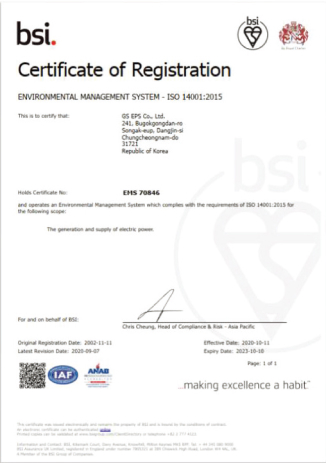Enviroment
GS EPS pursues sustainability management through environmental preservation and improvement
GS EPS pursues sustainability management through environmental preservation and improvement
GS Group has established an environmental management policy to minimize the negative impacts of companies’ production activities on the environment. Based on this policy, GS EPS faithfully complies with environmental laws, such as the Framework Act on Environmental Policy, Act On The Integrated Control Of Pollutant-discharging Facilities, Clean Air Conservation Act, and Wastes Control Act, and makes efforts for sustainable environmental preservation.

GS EPS has established and operates an EHSQ(Environment, Health, Safety, Quality) management system that integrates the environment, health, safety, and quality management systems for stable power production and supply. GS EPS has established a global-level environmental management system by acquiring international standard ISO 14001 certification. Based on this system, we will manage environmental pollution, identify and improve risks, and spread environmental management.

To obtain ISO 14001 certification, environmental management policies that minimize the environmental impacts of business activities must be established, and relevant systems and activities must be performed.
GS EPS continues to monitor and improve activities to prevent environmental pollution and reduce the impact on the local ecosystem. It allows us to fulfill our responsibility as a company that lives in symbiosis with the local environment.
As the laws such as the Act On The Integrated Control Of Pollutant-discharging Facilities enforced in 2017, and the Emission-Cap Regulation and Emissions Trading for Air Pollution Control enforced in 2020 are strengthened continuously. GS EPS is optimizing environmental facilities, inspecting air emission facilities, and conducting environmental monitoring.
GS EPS strives to minimize waste and increase recycling rates. Wastes that cannot be recycled are disposed of according to legal procedures. The target recycling rate of all waste in the workplace is 95%.
According to the Chemical Substances Control Act, GS EPS conducts regular facility inspections and response training by specialized inspection agencies. In addition, GS EPS establishes and operates an emergency response system and provides regular safety and health education to minimize damage from accidents.
The impact of power plant operation on the surrounding area and ecosystem is analyzed, and the post-environmental impact is monitored annually. Even the projects that have completed monitoring for post-environmental impacts are continuously traced and managed.
GS EPS reuses wastewater as raw water and process water and strictly treats wastewater by applying in-house criteria stricter than the water quality standards for discharged water. In addition, the facilities are repaired in advance, and old facilities are replaced for the proper operation of wastewater disposal facilities.
We reduce greenhouse gas emissions for energy efficiency and renewable power generation to reduce carbon emissions affecting climate. GS EPS built Biomass Unit 2 in 2021 and derived many activities, including photovoltaic generation.
GS EPS, as a company subject to the GHG emissions trading system, is annually verified by a specialized external institution for its greenhouse gas emissions and energy usage statements and then submits the result to the government.
GS EPS makes efforts to increase energy efficiency by reducing power consumption and chemical usage in power plants through innovation activities such as best practices in facility/operation and internal suggestion system. We are also realizing smart power plants through DX utilizing big data and machine learning.
GS EPS actively reviews the application of hydrogen-premix combustion, hydrogen combustion of old power plants, and CCUS* technologies as a mid-to-long-term plan for carbon reduction to net-zero by 2050.
* Technology to capture, utilize, and store emitted carbon dioxide
GS EPS is continuously interested in external projects* such as domestic and international new renewable power generation to reduce greenhouse gas emissions.
* A project to reduce, absorb, or remove greenhouse gases outside the organizational boundaries of the companies subject to assignment in a manner that meets international standards.
GS EPS expands new renewable energy such as biomass and photovoltaic power generation to reduce greenhouse gas emissions and convert to an eco-friendly energy structure.